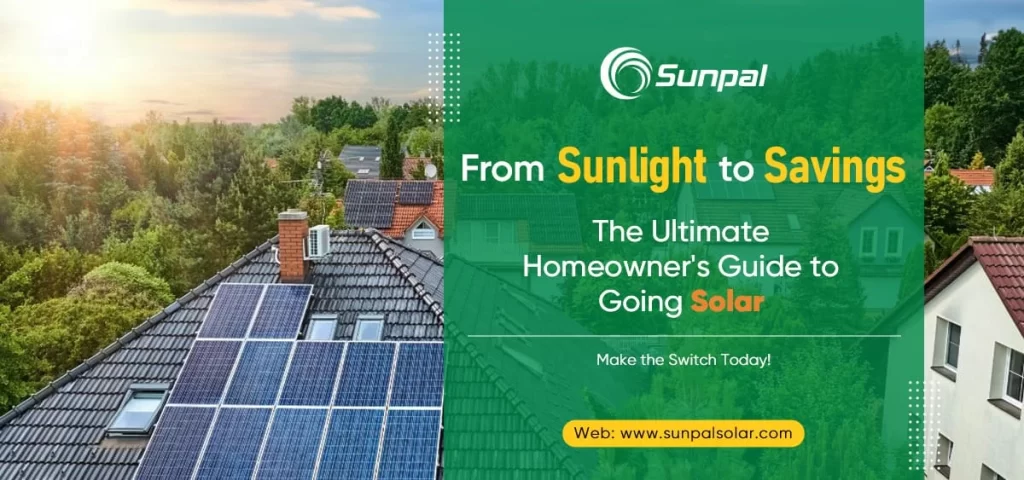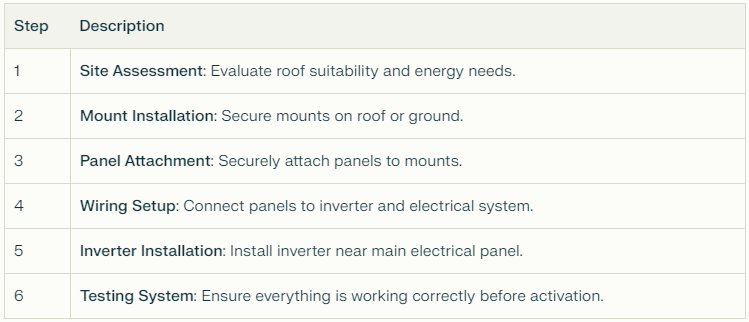
Are you considering switching to solar energy? You’re not alone! Many homeowners are exploring solar energy as a way to reduce energy costs while contributing to a sustainable future. In this homeowner's guide to going solar, I’ll explain everything you need to know about going solar — from the basics to the installation process and beyond. Let’s get started!
Understanding Solar Energy: A Homeowner's Guide to Going Solar
First things first, what is solar energy?
Solar energy is the power we harness from the sun’s rays. It is clean, renewable and abundant. When you install solar panels on your home, you convert sunlight into electricity that you can use to power your appliances and reduce your dependence on the electricity grid.
Types of Solar Panels
There are different types of solar panels, each with their own advantages:
- Monocrystalline Panels: Known for their high efficiency and sleek appearance.
- Polycrystalline Panels: Generally less expensive but slightly less efficient.
- Bifacial Panels: These can capture sunlight from both sides, maximizing energy production.
Understanding these options is crucial to choosing the right system for your home.
Benefits of Going Solar: A Homeowner's Guide to Going Solar
Why should you consider a solar energy system? Here are some compelling benefits:
1. Cost Savings on Electricity Bills
One of the most immediate benefits of solar energy is the potential for significant savings on your electricity bills. Once your system is installed, you generate your own electricity, which translates into lower monthly costs.
2. Environmental Impact and Sustainability
Solar energy is a clean energy source that reduces greenhouse gas emissions. When you choose solar energy, you have a positive impact on the environment and contributing to a greener planet.
3. Increase in Property Value
Homes equipped with solar panel systems often see an increase in property value. Many buyers are actively looking for energy-efficient homes, making solar a smart investment.
Assessing Your Home’s Suitability: A Homeowner's Guide to Going Solar
Before diving into installation, it’s essential to assess whether your home is suitable for solar panels.
Evaluating Energy Consumption
Start by reviewing your energy bills to understand your current consumption patterns. This will help you determine how much power you need from your solar system.
Roof Space and Orientation Considerations
Next, evaluate your roof:
Is there enough space?
Is it free from shading by trees or buildings?
What direction does it face? South-facing roofs typically receive the most sunlight.
Choosing the Right Solar Panel: A Homeowner's Guide to Going Solar
Selecting the right solar panel system is crucial for maximizing efficiency and savings.
Comparing Different Types of Solar Panels
Consider factors like efficiency ratings, warranty periods and price when comparing different types of panels. Investing in high-quality panels can lead to better performance over time.
Importance of Efficiency Ratings
Efficiency ratings indicate how well a panel converts sunlight into electricity. Higher efficiency means that more power is generated from the same amount of sunlight!
Financing Your Solar Installation: A Homeowner's Guide to Going Solar
Going solar is an investment, but there are multiple financing options available:
Purchase vs. Lease vs. Power Purchase Agreements (PPAs)
- Purchase: Pay upfront for your system.
- Lease: Pay a monthly fee for using the system without owning it.
- PPAs: Pay for the electricity generated at a set rate without owning the panels.
Available Incentives and Tax Credits
Don’t forget about incentives! Many states offer tax credits or rebates for installing solar systems, which can significantly reduce costs.
The Installation Process: A Homeowner's Guide to Going Solar
Once you've decided to go solar, here’s what you can expect during the installation process:
Step-by-Step Installation Overview
1. Site Assessment and Planning: A professional will evaluate your home and create a customized plan.
2. Installation of Racking and Panels: The mounting structure is installed first, followed by securely attaching the panels.
3. Wiring and Inverter Setup: Your inverter converts DC electricity from the panels into AC electricity for use in your home.
Detailed Installation Steps:

Maintenance Tips for Your Solar Panel System: A Homeowner's Guide to Going Solar
After installation, maintaining your solar panel system is relatively straightforward:
Regular Cleaning and Inspections
Remove dirt or debris that could block sunlight to keep your panels clean. Regular inspections ensure everything is functioning correctly.
Monitoring System Performance
Consider installing an energy monitoring system to track how much power you generate and use. This can help you identify any issues early on.
Common Myths About Going Solar: A Homeowner's Guide to Going Solar
There are many misconceptions about solar energy that can deter homeowners from making the switch:
Debunking Misconceptions Surrounding Solar Energy
- Myth: Solar panels only work in sunny climates.
- Reality: They can generate power even on cloudy days!
- Myth: Solar systems are too expensive.
- Reality: With financing options and incentives, they’re more affordable than ever!
Real-Life Success Stories: A Homeowner's Guide to Going Solar
Let’s look at some real-life examples:
Case Studies Highlighting Benefits and Experiences
Many homeowners have reported significant savings after going solar. For instance, one family reduced their electricity bill by over 50% after installing a 6 kW system!
Future Trends in Solar Technology: A Homeowner's Guide to Going Solar
The future of solar technology looks bright!
Innovations on the Horizon
Expect advancements in efficiency and storage solutions that will make solar even more accessible and effective.
The Role of Smart Technology in Solar Systems
Smart technology will allow homeowners to optimize their energy usage further, making it easier to manage home energy consumption effectively.
Custom Solutions from Sunpal Solar: A Homeowner's Guide to Going Solar
At Sunpal Solar, we recognize that every homeowner has unique needs when going solar.
Our professional team can design custom solar panel solutions tailored to your project requirements.
Whether you're looking for residential systems or larger commercial applications, we’ve got you covered.
We also deliver customized OEM solutions that include product design, performance customization and branding services tailored just for you.
Our advanced technology and equipment allow us to meet the specific requirements of our clients effectively.
With our commitment to quality and innovation, Sunpal ensures that every installation meets international standards while providing top-notch performance year-round.
If you're ready to take action toward renewable energy solutions, consider reaching out today! You can buy solar panels from a manufacturer that prioritizes quality—choose Sunpal Solar!
FAQs: Homeowner's Guide to Going Solar
1. What is the average cost of installing solar panels for a home?
The cost of installing solar panels can vary widely based on several factors, including the size of the system, type of panels, installation complexity, and local labor rates. On average, homeowners can expect to pay between $15,000 and $25,000 for a complete solar panel system before tax credits or incentives.
2. How long does it take to install a solar panel system?
The installation process typically takes one to three days depending on the size of the system and the complexity of installation; however, obtaining permits and approvals can add several weeks before installation begins.
3. Do I need a permit to install solar panels?
Yes! Most local governments require permits for solar panel installations; specific requirements can vary by location so it’s essential to check with your local building department or work with a professional installer who can handle permitting processes for you.
4. What happens if my solar panels produce more energy than I use?
If your solar panels generate more electricity than you consume, excess energy can often be sent back into the grid through net metering; this allows you to earn credits on your utility bill for future use effectively reducing overall energy costs.
5. How do I know if my roof is suitable for solar panels?
To determine if your roof is suitable for solar panels consider factors such as roof age/condition (ideally less than ten years old), orientation (south-facing roofs typically receive most sunlight), and shading from trees/buildings that may obstruct sunlight exposure during peak hours.
6. Can I install solar panels myself?
While technically possible it’s generally not recommended unless you have experience with electrical systems/roofing; professional installers ensure proper/safe installations which save time/potential headaches down the line.
7. What maintenance do solar panels require?
Solar panels require minimal maintenance; regular cleaning/removal of dirt/debris blocking sunlight is essential along with periodic inspections by professionals ensuring everything functions correctly over time.
8. How long do solar panels last?
Most solar panels come with warranties ranging from 25 years up; however many systems last longer than this with proper care/maintenance often exceeding thirty years while still maintaining efficiency levels over time!
9. Will going solar increase my property taxes?
In many cases installing solar panels does not increase property taxes due to specific laws in place across various states exempting renewable energy systems from assessments; however, checking local regulations beforehand is essential as they vary widely!
10. What incentives are available for homeowners going solar?
Various incentives exist at federal/state/local levels significantly reducing costs associated with going green including tax credits (like the Federal Investment Tax Credit), rebates from utility companies & state-specific programs designed to promote renewable adoption!
11. Can I finance my solar panel installation?
Yes! Many homeowners choose financing options such as loans or leases covering upfront costs associated with installations; some programs allow rolling financing into mortgages while offering low-interest loans specifically targeting renewable projects!
12. What are the environmental benefits of going solar?
Going green reduces reliance on fossil fuels decreasing greenhouse gas emissions significantly; harnessing clean energy from the sun contributes positively towards sustainability efforts combating climate change overall!
13. What should I do if I have more questions about going solar?
If additional questions arise regarding transitioning towards renewable sources and seeking personalized advice tailored specifically towards individual situations consider reaching out to professional installers like Sunpal Solar who are ready to help guide you through every step process effectively!
This comprehensive guide provides valuable insights into common concerns homeowners may have when considering going solar while complementing information already provided without redundancy! If you're ready for this transition towards sustainable living don't hesitate—reach out today!
